Module 6 Unit 5 The power of nature
文档属性
| 名称 | Module 6 Unit 5 The power of nature |
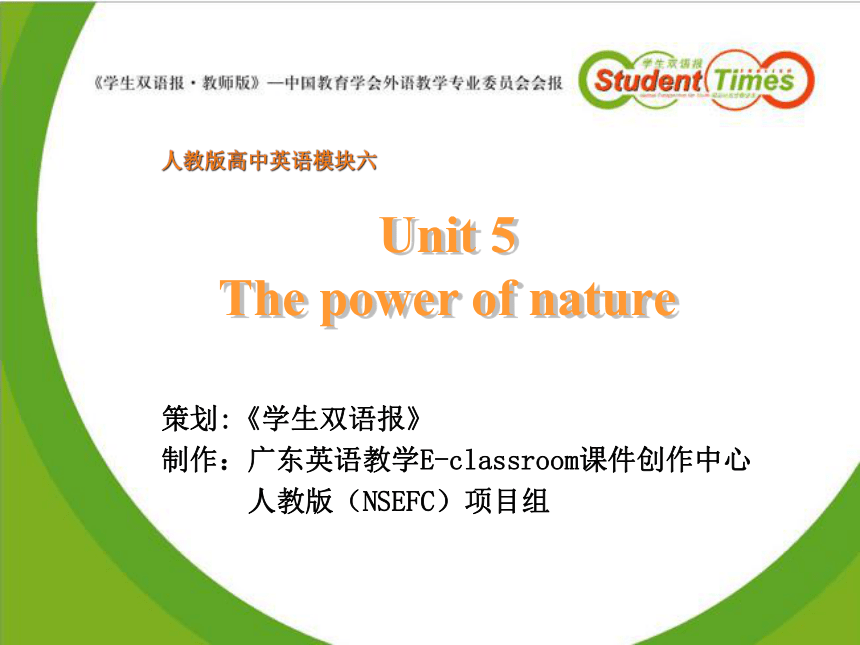
|
|
| 格式 | rar | ||
| 文件大小 | 4.5MB | ||
| 资源类型 | 教案 | ||
| 版本资源 | 人教版(新课程标准) | ||
| 科目 | 英语 | ||
| 更新时间 | 2008-01-02 00:00:00 | ||
图片预览

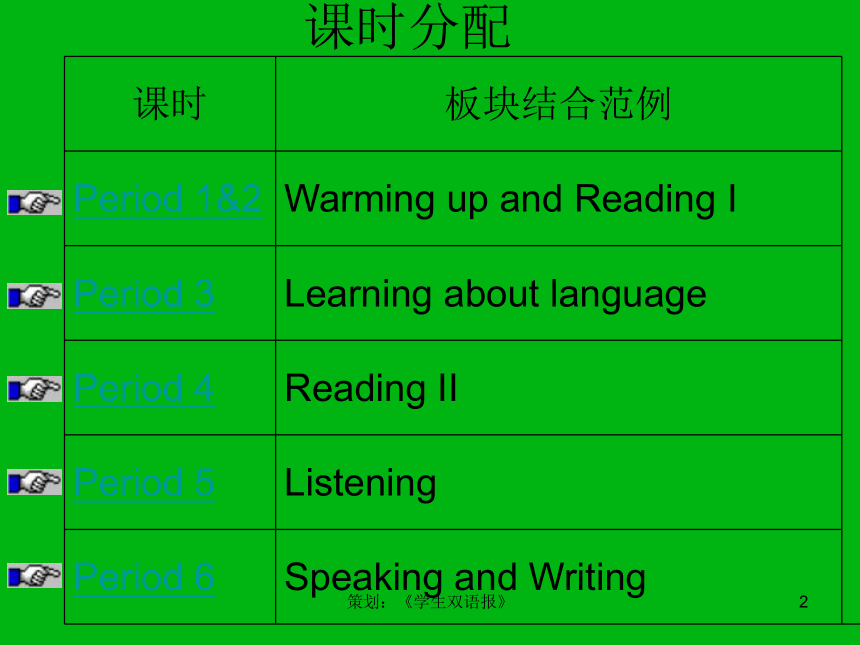
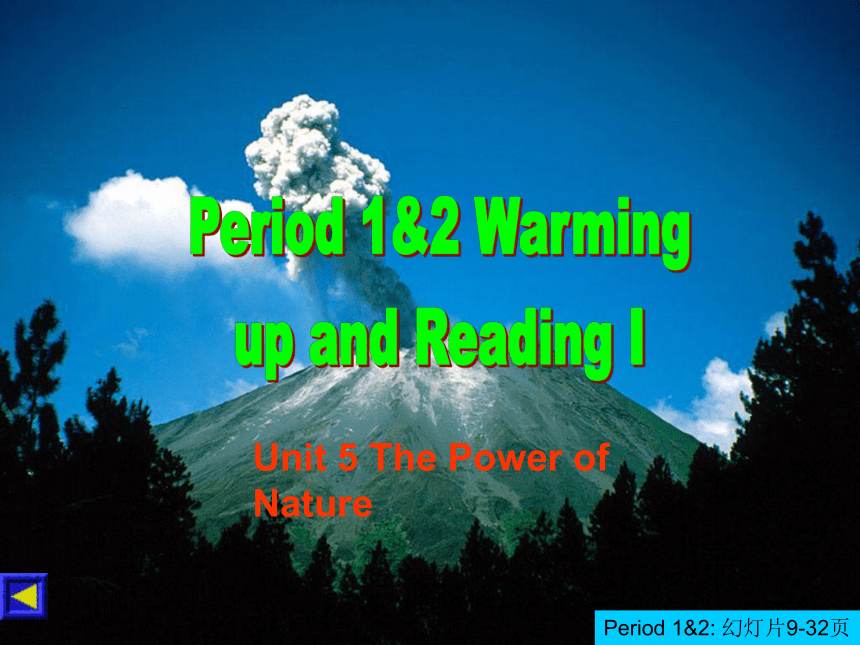
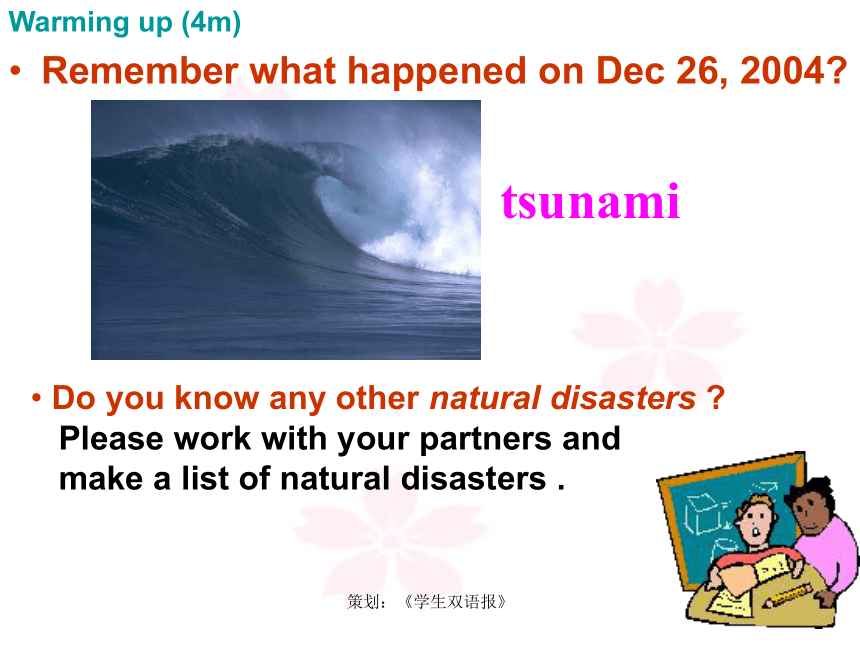
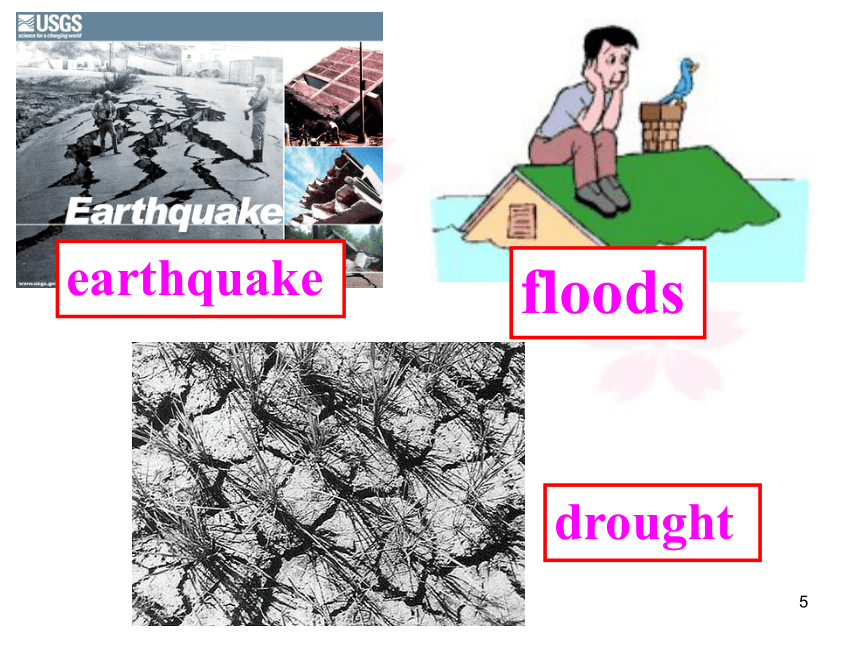
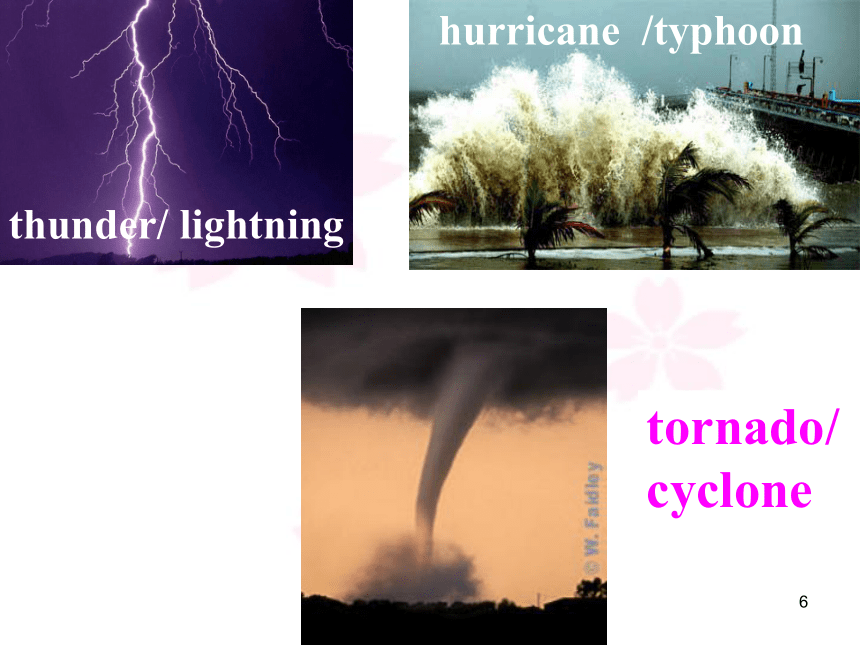
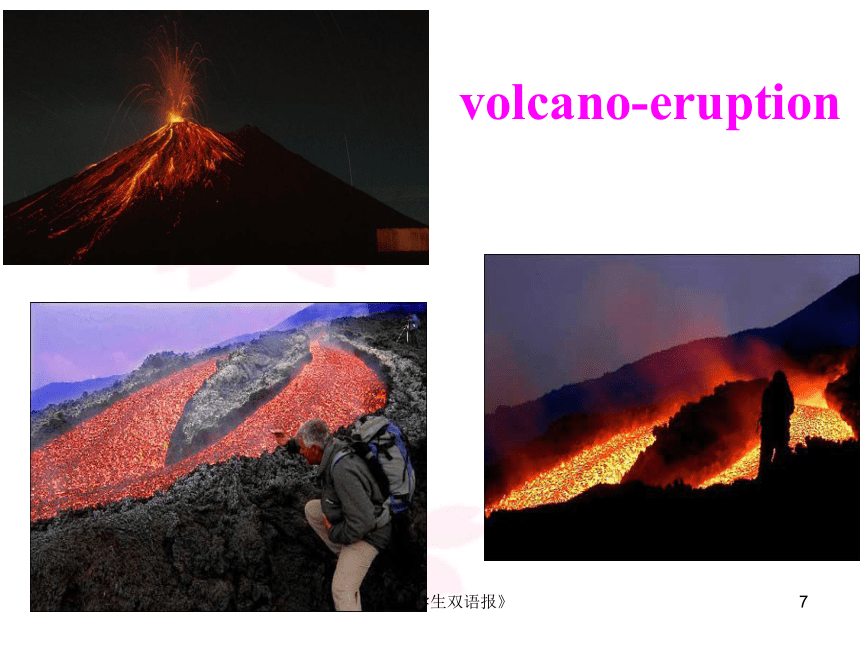
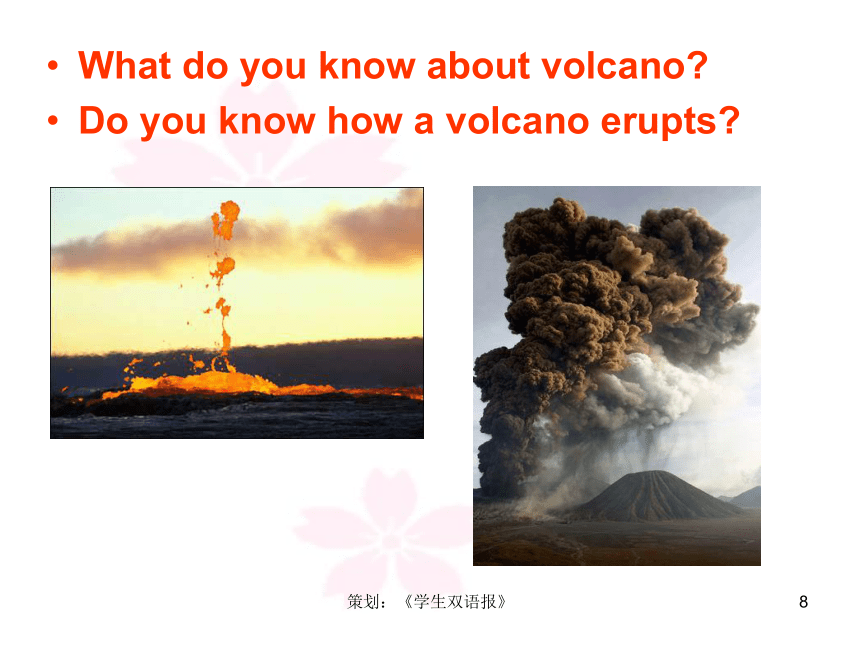
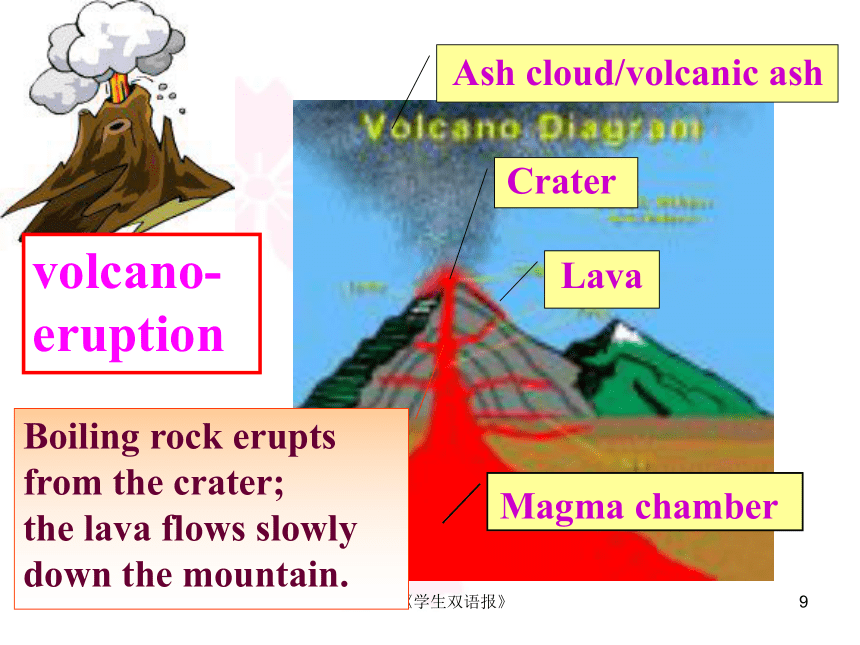
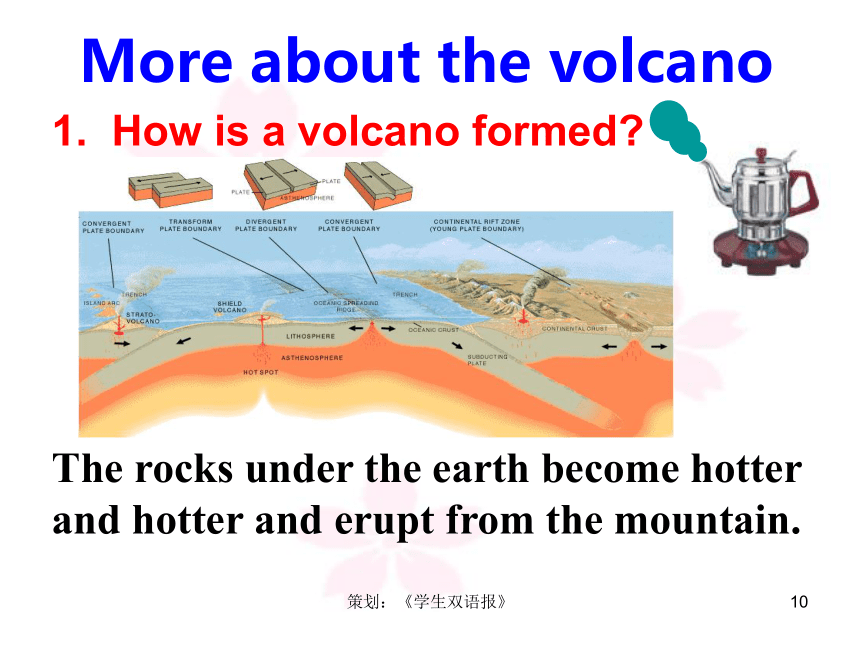
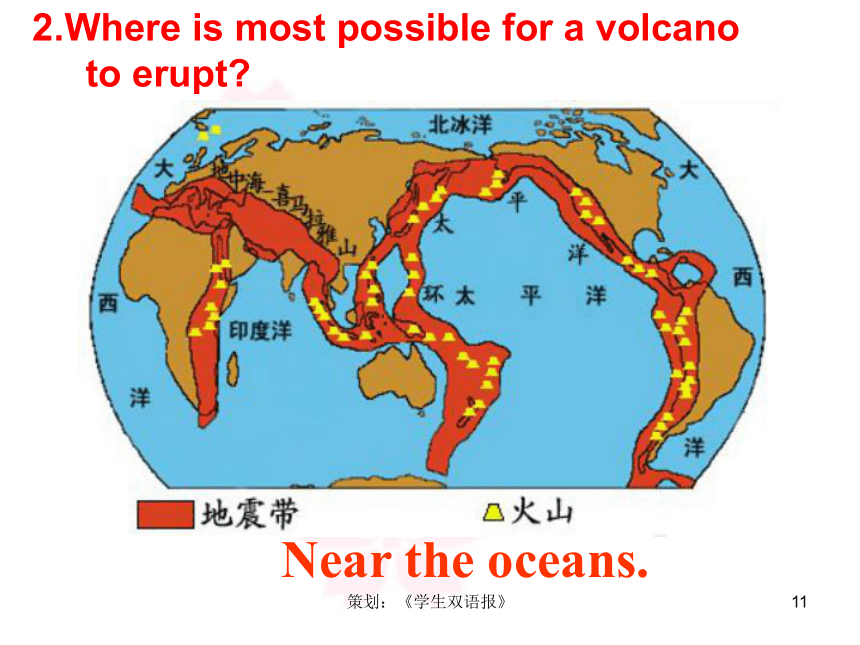
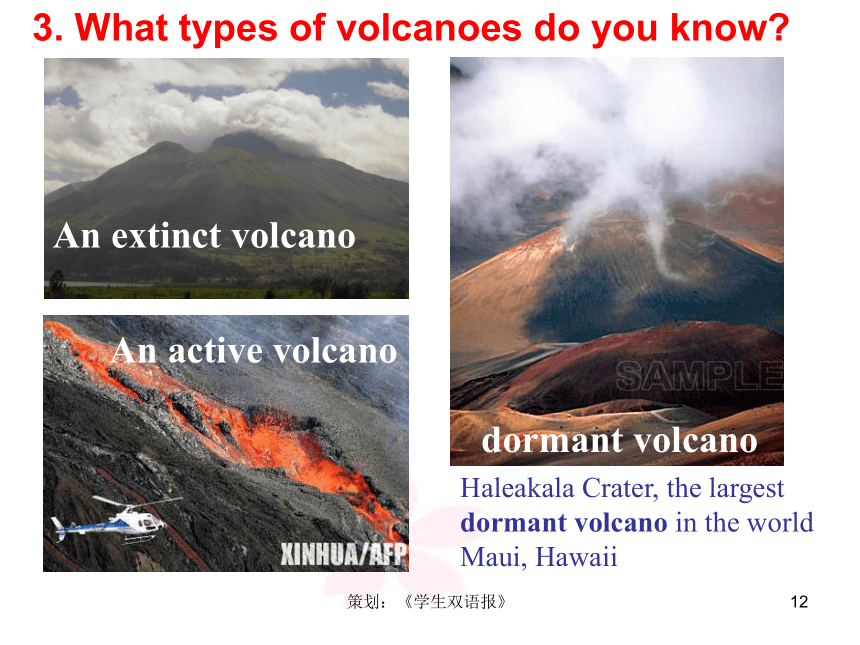
文档简介
课件104张PPT。策划:《学生双语报》1
Unit 5
The power of nature策划:《学生双语报》
制作:广东英语教学E-classroom课件创作中心
人教版(NSEFC)项目组 人教版高中英语模块六策划:《学生双语报》2课时分配策划:《学生双语报》3Period 1&2 Warming
up and Reading IUnit 5 The Power of Nature Period 1&2: 幻灯片9-32页策划:《学生双语报》4Remember what happened on Dec 26, 2004?tsunami Do you know any other natural disasters ?
Please work with your partners and
make a list of natural disasters .Warming up (4m)策划:《学生双语报》5earthquakefloodsdrought策划:《学生双语报》6thunder/ lightningtornado/cyclonehurricane /typhoon策划:《学生双语报》7volcano-eruption策划:《学生双语报》8What do you know about volcano?
Do you know how a volcano erupts?策划:《学生双语报》9volcano-eruptionBoiling rock erupts from the crater;
the lava flows slowly down the mountain. Magma chamberLavaCraterAsh cloud/volcanic ash策划:《学生双语报》10More about the volcano1. How is a volcano formed?The rocks under the earth become hotter and hotter and erupt from the mountain.策划:《学生双语报》11Near the oceans.Where is most possible for a volcano
to erupt?策划:《学生双语报》12An extinct volcanoHaleakala Crater, the largest dormant volcano in the world
Maui, Hawaii
An active volcano3. What types of volcanoes do you know?dormant volcano策划:《学生双语报》13What qualities are needed for a volcanologist?
Are you suitable for being a volcanologist ?
Answer “yes”or “no” to the following questions.Pre-reading (4m)策划:《学生双语报》14Predicting
(预测) What might be talked about?策划:《学生双语报》15What is the writer?
When did he first see an eruption? How did it look like?
What was he wearing when getting close to the crater? And what was the result?Skim the text and answer the following questionsSkimming (3m)策划:《学生双语报》16What is the writer?
When did he first see an eruption? How did it look like?
He is a volcanologist working for the Hawaiian Volcano Observatory. He mainly collects information about Mount Kilauea.It was in the second week after he arrived in Hawaii. It was very bright although it was night. Red lava fountained hundreds of meters into the air and it was a fantastic sight.策划:《学生双语报》173. What was he wearing when getting close to the crater? And what was the result?He was wearing white protective suits that covered his whole body, helmets, big boots and special gloves, just like a spaceman. As a result, it made him difficult to walk.策划:《学生双语报》181. Why is a volcanologist’s job important?
2. Why is the lava that flows on Mount Kilauea more dangerous than the actual eruption?
3. Why did the scientists have to get close to the volcano after it began erupting?
What does the writer find impressive
about volcanoes even after studying
them for 20 years?
Scan the text and answer the following questionsScanning (5m)策划:《学生双语报》191.Why is a volcanologist’s job important?
Volcanologists study volcanoes so that they can warn people when the volcano is going to erupt and so save many lives.
2. Why is the lava that flows on Mount Kilauea more dangerous than the actual eruption?
The lava flows down the mountain and can cover up or burn villages in its path. The rocks that erupt from the volcano usually don’t damage anything because no one lives near the crater.
策划:《学生双语报》203. Why did the scientists have to get close to the volcano after it began erupting?
The scientists needed to get samples of the lava so they could study them.
4. What does the writer find impressive about volcanoes even after studying them for 20 years?
The author is impressed by the beauty of the eruption and also by its potential to cause great destruction.策划:《学生双语报》21Part 1(Para 1-2)
Part 2(Para 3-4)
Part 3(Para 5)
The writer’s job and its importance The writer’s experience of watching the volcano eruptionThe reasons for the writer’s enthusiasm about his jobFind out the main idea of each part (4m)策划:《学生双语报》22
Suppose you are a reporter of the 21st Century, and you are interview the writer. Work in pairs and make up a dialogue according to your understanding of the passage.Dialogue production (5m)策划:《学生双语报》23
Having learnt a little more about the work of a volcanologist, do you think it is an occupation you would enjoy? Discuss your reasons with others in your class.
Discussion (8m)策划:《学生双语报》24 Assignment (Homework) Find out words, expressions and sentences which you think are useful, important or difficult to understand.
Finish exercises in Learning about Language. (Ex. 1, 2)策划:《学生双语报》25Language points for reading I策划:《学生双语报》26Take a break!策划:《学生双语报》27Period 3 Learning
about languageUnit 5 The Power of Nature Period 3: 幻灯片33-48页策划:《学生双语报》28I went to a tea house with tow friends last weekend but all they talked about was volcanoes. I was so _____ that I fell asleep.
A tourist very foolishly took a risk by walking right to the edge of an active_________.
I carefully __________________ over the fallen rocks and returned to the car.
Nothing can ______________ the experience of standing close to an active volcano for the first time.
Can volcanologists predict when a volcano will_______.
The sight of hot lava entering the sea at dawn was___________.boredvolcanomade my waycompare witheruptimpressiveCheck the answers to Ex. 1 on page 35策划:《学生双语报》29 The eruption of Mount Vesuvius in 79AD took people in Pompeii by surprise. It was so quick and so severe that the town was soon covered in _____ and ______. Many houses in the town were __________________. It was an ________ disaster for many people who could not get away in time. A writer named Pliny, who was there during the ________, described how lava was thrown into the air like a ________. ______________ many of the townspeople, _________at the _________ sight of Vesuvius eruption, stayed too long and failed to escape in time.burnt to the groundabsoluteashlavaeruptionfountainUnfortunatelyamazedfantasticCheck the answers to Ex. 2 on page 36策划:《学生双语报》30Mount Vesuvius
This mountain has erupted more than 50 times since the eruption in 79 A.D., when it buried Pompeii and its sister city, Herculaneum.
After Pompeii was buried and lost to history, the volcano continued to erupt every 100 years until about 1037 A.D., when it entered a 600-year period of quiescence.
In 1631, the volcano killed an additional 4000 unsuspecting inhabitants. 策划:《学生双语报》31Examine the sentences below and tell the similarity and difference between these two sentences.
Looking carefully at the ground, I made my way to the edge of the crater.
Having experienced quite a few earthquakes in Hawaii already, I didn’t take my notice.
The present and perfect -ing form The –ing form can be used as an adverbial in a sentence to give information about time, reasons or results. We use the construction having+past participle to refer to an action that took place before the time expressed by the main verb.策划:《学生双语报》32Rewrite the sentences using the present or the perfect –ing form of the underlined verbs.
When they heard about the volcano they ran down to the village.
After the scientists had studied the information they predicted that the lava would flow through the village.
Hearing about the volcano, they ran down to the village.Having studied the information, the scientists predicted that the lava would flow through the village.策划:《学生双语报》33Having experienced earthquakes before, I wasn’t frightened.
Walking up in the middle of the night she saw her room was as bright as day.
Having stopped the car, we immediately put on our protective clothing.
Having spent all night watching the volcano erupting, I was very tired the next day.
Coming out of my house, I saw the volcano erupting.
Never having seen a volcano erupting before, I was very excited.策划:《学生双语报》34Combine the pairs of sentences using the present or the perfect –ing form. Walking through the forest, you can find some unusual plants.
Having been a teacher for 12 years, Charlotte knew how to keep children interested.
Preferring not to go out that night, I made an excuse.We arrived at the party. We saw Carol standing along at the entrance.Arriving at the party, we saw Carol standing alone at the entrance.策划:《学生双语报》35Not expecting anyone to be in the house, I walked straight in.
Having been out of work for two months, Dave was willing to take any job that was offered.
Being unable to speak Japanese, I found life in Tokyo difficult.
Having felt ill all day, Marie cancelled her appointment with her friends.
Knowing the job was important to her husband, she made an effort to be nice to her boss.
策划:《学生双语报》36“You can’t catch me!” Janet shouted, _______ away.
A. run B. running
C. to run D. ran 高考链接B解析:答案B。running away在此作shouted的伴随状语,由Janet发出这一动作。策划:《学生双语报》372. The storm left, ________ a lot of damage to this area.
A. caused B. to have caused
C. to cause D. having caused高考链接D解析:答案D。题意:暴雨过去了,只留下给这一地区造成的巨大损害。由上下文逻辑意义看,此处应表示自然而然的结果,故用现在分词作结果状语。策划:《学生双语报》383. ________ in the queue for half an hour, Tom suddenly realized that he had left his wallet at home.
A. to wait B. have waited
C. having waited D. to have waited高考链接C解析:答案C。此处为现在分词的完成式作时间状语,表明该动作发生在realized之前。策划:《学生双语报》394. _______ such heavy pollution already, it may now be too late to clean up the river.
A. Having suffered B. Suffered
C. To suffer D. Suffered高考链接A解析:答案A。由already提示,分词动作发生在谓语之前,故须用分词的完成式。策划:《学生双语报》405. The secretary worked all night long, _____ a long speech for the president.
A. to prepare B. preparing
C. prepared D. was preparing高考链接B解析:答案B。非谓语动词充当伴随状语,与主语the secretary是主动关系,因此用v.-ing形式。策划:《学生双语报》41Homework Review the difference and similarity between present and perfect v-ing form used as an adverbial.策划:《学生双语报》42Take a break!策划:《学生双语报》43Period 4 Reading IIUnit 5 The Power of Nature Period 4: 幻灯片49-68页策划:《学生双语报》44Have you ever enjoyed any Natural wonders?
Share your experience and feelings.策划:《学生双语报》45Mount Tai ShanMount Hua Shan策划:《学生双语报》46Jiu Zhai Gou策划:《学生双语报》47Mount Chang Bai ShanTian Chi策划:《学生双语报》48策划:《学生双语报》49The Lake of Heaven策划:《学生双语报》50springsummerautumnwinter策划:《学生双语报》51Read the text quickly and find out the key words(关键词)of each paragraph.Paragraph 1
Paragraph 2
Paragraph 3
Paragraph 4
ChangbaishanTianchistoriescoinFast Reading (3m)策划:《学生双语报》52Paragraph 1ChangbaishanLocation(位置)Position(地位)HeightRare animals The aims of visitorsThe most attractionIntensive Reading (5m)策划:《学生双语报》53Location Jilin Province, Northeast ChinaPosition China’s largest nature reserveHeight varies from 700 m to 2,000 mRare animalscranes, black bears, leopards and Siberian tigersThe aims of visitorsTo study the plants and animals ;
walk in the mountains;
see the waterfalls ;
bathe in the hot water poolsThe most attractionTianchi, the Lake of Heaven策划:《学生双语报》54Paragraph 2Tianchiintroductionheightdepth2,194m more than 200msightdeep lake has formed in the craterthe crystal clear water
the other sixteen mountain peaks
策划:《学生双语报》55Paragraph 3 Fill in the blanks with some persons or animals to complete the chart.Three young women
from heavenbathingA birdflewdroppedThe youngest
girlA handsome
boyswallowedgave birth tofruitpregnantThe Manchu
peoplefather策划:《学生双语报》56Paragraph 4coinYou and your ______ one drop a ____ into the clear, blue water to ________ your love will be as _____ and _______ as the lake. lovedcoinguaranteedeeplasting策划:《学生双语报》571.Changbaishan is the second largest nature reserve in China.
2. The peak of Changbaishan can reach as high as 2,000 meters.
3. You can see a lot of black bears, leopards or cranes in Changbaishan.
4. Tianchi is a lake in the crater of an extinct volcano.
5. The ancestors of the Manchu people were believed to be good at language and persuasion. F T F T TConsolidation (5m)1. True or false策划:《学生双语报》582. QuestionsIn what province is Changbaishan?
What is a nature reserve? Why is Changbaishan a famous nature reserve?
What is the most popular tourist attraction in the reserve?
In Jilin Province.A place kept in its natural state for people to enjoy. The largest one in China.Tianchi, or the Lake of Heaven.策划:《学生双语报》59
4.What does Tianchi mean? How is Tianchi formed?
5.What is the connection between the Manchu people and Tianchi?The Lake of Heaven. In the crater of a dead volcano.The story.策划:《学生双语报》60Homework Surf the Internet to find more information about the Lake of Heaven.策划:《学生双语报》61Language points for reading II策划:《学生双语报》62Take a break!策划:《学生双语报》63Period 5 ListeningUnit 5 The Power of Nature Period 5: 幻灯片69-80页策划:《学生双语报》64Can you imagine the volcanologists’ work?
They often face the dangerous situation.
Can you guess what the following three volcanologists’ most frightening experience are?Pre-reading (3m)策划:《学生双语报》65A. Frank Gore
B. Jane Small
C. Sarah Tang Look at the pictures of volcanologists at work on page 38. Then listen to them talking about their most frightening experience. Write their names under the picture.Listening-I (5m)策划:《学生双语报》66 Listen to the tape again. Stop the tape after each person has spoken and answer the questions about his/her experience.
How long has she been a volcanologist?
In what country was the volcano he/she talks about?
Why did he/she forget to be frightened?Listening-II (5m)策划:《学生双语报》67
Jane Small
How long has she been a volcanologist?
Five years.
2. In what country was the volcano she talks about?
Alaska
3. Why did she forget to be frightened?
She was excited about what she had done.Listening-II (5m)策划:《学生双语报》68
Frank Gore
How long has he been a volcanologist?
In what country was the volcano he talks about?
Why did he forget to be frightened?Ten years.
Hawaii.
The pilot had to fly low to get under the clouds.Listening-II (5m)策划:《学生双语报》69
Sarah Tang
How long has she been a volcanologist?
In what country was the volcano she talks about?
Why did she forget to be frightened?Twenty years.
New Zealand.
She felt the ground tremble.Listening-II (5m)策划:《学生双语报》701. I was so excited about what I had done and where I was, I forgot my fear. ( )
2. I was very worried that the volcano might erupt while I was still inside it. ( )
3. I was very relived when we finally reached our camp. ( )
4. I was trembling almost as much as the ground under my feet. ( )Jane SaraSaraFrankListening-III (5m) Listen to the tape once more. Write the name of the person beside the things they said.策划:《学生双语报》715. I was still terrified. ( )
I was so nervous that my whole body was damp with sweat. ( )
I was so anxious that I couldn’t move for a long time. ( )
I had to force myself not ton panic. ( )
Then I got up the courage to bend over the boiling lava. ( )Jane Jane Jane FrankJane 策划:《学生双语报》72 Think of a powerful natural force (such as an earthquake, food, typhoon, storm) that you have experienced. You can use your imagination if you have not experienced any of these things. Tell your partner about your experience and how you felt. Speaking (8m)策划:《学生双语报》73HomeworkForm a group with another pair and tell them about your dangerous experience.策划:《学生双语报》74Take a break!策划:《学生双语报》75Period 6 Speaking
and writingUnit 5 The Power of Nature Period 6: 幻灯片81-90页策划:《学生双语报》76floodvolcano eruptiontsunami策划:《学生双语报》77firehurricanesnowstormtornado策划:《学生双语报》781. Choose one of the natural disasters or any other disaster you know about. 2. Make a timeline to show the order in which the events happened. For example:10am left holiday house to walk in the mountains
12am saw dark clouds in the sky, started to go back
12:30pm snowstorm started
1:00pm we were completely lost
… …策划:《学生双语报》793. Work with your partner. Take turns to tell your story. When you listen to your partner’s story, ask questions about how he/she felt at different times.策划:《学生双语报》804. Spend a few minutes on your own imagining your experiences and how you felt. Now imagine you are safely back home. Write a dairy entry about your experience.策划:《学生双语报》81Writing sample Jane and I had been waking in the mountains when we noticed some dark clouds coming down the mountain. We decided to turn around and go home.
As we walked the clouds got nearer and nearer and the day grew darker. Then all of a sudden it began to snow. It was soon snowing so hard we couldn’t see very far in front of us. Holding each others’ hands so we couldn’t get separated, we continued down the mountain. 策划:《学生双语报》82 But the snow got deeper and deeper. Walking became harder and harder. We began to get very tired and very frightened.
After a while the path became buried under the snow and we didn’t know which way to go. We were completely lost. We found some shelter behind a big rock. Hugging each other for warmth, we stayed like that until the storm was over. Luckily it only lasted an hour or two. Then the sun came out again and we could see our house in the distance. We were so relieved we both burst into tears.策划:《学生双语报》83Homework Revise your writing.策划:《学生双语报》84Take a break!策划:《学生双语报》85Language points for Reading I
Language points for Reading II
Video dataLanguage Data Bank策划:《学生双语报》86volcano n.pl. volcanoes an active volcano
an extinct volcano
a dormant volcano-logy: “…… 学/论。”volcanology-ist “……学家 ”volcanologist 活火山
死火山
休眠火山火山学
pianist
physicist火山学家oceanology
climatologyLanguage points for Reading I策划:《学生双语报》872. erupt
1)(火山)爆发,喷发
维苏威火山已经多年没有爆发了。
Mount Vesuvius hasn’t erupted for a good many years.2)(搏斗,暴力事件,噪音等)突然发生,爆发街头暴力可以在没有明显原因的情况下爆发。
Violence in street can erupt for no apparent reason.erupt into laughter/shouting/crying, etc.突然大笑/叫喊/大哭他毫无理由地大笑起来。
He erupted into laughter without any reason.策划:《学生双语报》88 bored
boringI am _____with the same old routine day after day.The book is ______.boredboring3. Sometimes working indoors…, I’m never bored.(人)厌烦的
(物)令人厌烦的bore v. (尤指无聊的长话)使(人)厌烦很抱歉说了这么长时间;希望你没有厌烦。
I am sorry I spoke for so long
---I hope I didn’t bore you.父亲老是在说在战争中的经历,我们都厌烦了。
My father is always boring us with his stories about the war. 策划:《学生双语报》89bore sb. to death 使某人厌烦得要命他老是问同样的问题,真是烦死我了。
He is always asking the same question, which bores me to death. bore n.令人厌烦的人,令人厌烦的事他是一个令人厌烦的人,整天早上都在忙他的慈善工作。
He was something of a bore---going on about his charity work all morning. 做家务真是令人烦透了。
Doing housework is a real bore.策划:《学生双语报》90Having collected and evaluated the information, I help other scientists to predict where lava from the volcano will flow next and how fast it will flow.
4. evaluate 评估,评价没见过他的工作,我无法评估他的能力。
I cannot __________________ without seeing his work.evaluation n. [C,U]评估,评价,评估报告They made an intensive evaluation of the health
care program.evaluate his ability策划:《学生双语报》915.warn sb. (of /against sth.)
sb. to do
sb. that 1)I won’t warn you again.
2)The people were warned of the danger of flooding.
3)The doctor warned me not to drink.
(The doctor warned me against drinking.)
4) I warn you that it is dangerous to go out alone at night.策划:《学生双语报》926. burn to the ground 完全(楼房等)烧毁
他无处栖身因为他的房子被烧掉了.
He has no place to live in because his house has been burnt to the ground. burn away烧掉,烧光
木头已烧成灰烬.
The wood had burnt away to nothing.burn down(建筑物)全部被烧毁电影院去年被烧伤了.
The cinema burnt down last year.策划:《学生双语报》93burn off: to destroy by burning 烧掉
他在事故中严重受伤,头发也被烧掉了.
He was badly injured in the accident, and all his hair was burnt off.
burn out: to make hollow by fire; to stop working through damage caused by heat(由于过热而)烧坏
引擎被烧坏了.
The engine had burnt out.策划:《学生双语报》94burn up 烧毁烧尽to destroy completely by fire;
烧得更亮/旺 to flame more brightly or strongly
火箭重入地球大气层时烧毁.
The rocket burnt up when it reentered the earth’s atmosphere.
他往火上加木材想让它烧得更旺.
He put more wood on the fire to make it burn up.策划:《学生双语报》95It was an absolute fantastic sight.
7. absolute adj. 完全的,真实的
It’s an absolute fact.
absolutely adv. 完全地,无条件地,完全对
absolutely right 十分对,对极了,当然
(口语,作为对一问题的回答或评语)
-你让你的孩子晚上单独行走吗?
-当然不是。
-Do you let your kids walk alone at night?
-Absolutely not.策划:《学生双语报》968. make one’s way向某地走去, 有出息
她犹豫了一下,但向前走去.
She hesitated, but ______________________.
她快速离开房间,朝她床边走去.
She hastily left the room ,and _____________ ____________.
你若想要有出息,趁年轻的时候要学会发奋
If you want to __________________________, you must learn to work hard while you are still young.
made her way forward made her way to her bedmake your way in the world策划:《学生双语报》979. make way (for)让路,让位
所有的车辆都得给救火车让路.
All the traffic has to __________________ ________.
我将把职务让给更年轻的人.
I shall __________________________ . make way for a fire enginemake way for a younger man策划:《学生双语报》98feel one’ way
push one’s way
find one’s way
go one’s way
fight one’s way
wind one’s /its way
lose one’s way摸索前进挤过找到路,设法到达走自己的路,我行我素奋勇前进蜿蜒前进迷路策划:《学生双语报》99Language points for Reading IIThe height of the land varies from 700 meters
above sea level to over 2000 meters and is home to a great diversity of plants and animals.
1. vary v.
1) become different, change esp continually
(尤指持续地)(使)变化,改变
天气变化很大,从很冷到变得相当暖和。
The weather varied from very cold to quite mild.策划:《学生双语报》100保安车常常改变路线。
The security always varies its route.
2) be different 彼此相异
(彼此)在这问题上意见很不一致。
Opinions on this matter vary.
价钱因季节而变化。
The price varies according to the season.
策划:《学生双语报》101今天全国不同地区都下了雪。
There has been snow today in various parts of the country.
我们出售的产品是各式各样的。
The products we sell are many and various.various adj. different from each other, of different kinds策划:《学生双语报》102variety n.
1) = change (质量,种类和特征的)变化
他不喜欢这工作,因为它单调乏味。
He doesn’t like the work because it lacks variety.
2) = kind 种类,品种:
不同种类的香蕉
different varieties of bananas
a variety of 许多,各种各样
这些体恤有各种各样的颜色供挑选.
These T-shirts are available in a wide variety of colours.策划:《学生双语报》1032. diversity=variety 变化多样, 多样性
亚洲的植物形态多种多样.
The plants of Asia show great diversity
of form.
(对此)准时纵说纷纭.
There must be a wide diversity of opinions.
策划:《学生双语报》104The End
制作:广东英语教学E-classroom课件创作中心
人教版(NSEFC)项目组 人教版高中英语模块六策划:《学生双语报》2课时分配策划:《学生双语报》3Period 1&2 Warming
up and Reading IUnit 5 The Power of Nature Period 1&2: 幻灯片9-32页策划:《学生双语报》4Remember what happened on Dec 26, 2004?tsunami Do you know any other natural disasters ?
Please work with your partners and
make a list of natural disasters .Warming up (4m)策划:《学生双语报》5earthquakefloodsdrought策划:《学生双语报》6thunder/ lightningtornado/cyclonehurricane /typhoon策划:《学生双语报》7volcano-eruption策划:《学生双语报》8What do you know about volcano?
Do you know how a volcano erupts?策划:《学生双语报》9volcano-eruptionBoiling rock erupts from the crater;
the lava flows slowly down the mountain. Magma chamberLavaCraterAsh cloud/volcanic ash策划:《学生双语报》10More about the volcano1. How is a volcano formed?The rocks under the earth become hotter and hotter and erupt from the mountain.策划:《学生双语报》11Near the oceans.Where is most possible for a volcano
to erupt?策划:《学生双语报》12An extinct volcanoHaleakala Crater, the largest dormant volcano in the world
Maui, Hawaii
An active volcano3. What types of volcanoes do you know?dormant volcano策划:《学生双语报》13What qualities are needed for a volcanologist?
Are you suitable for being a volcanologist ?
Answer “yes”or “no” to the following questions.Pre-reading (4m)策划:《学生双语报》14Predicting
(预测) What might be talked about?策划:《学生双语报》15What is the writer?
When did he first see an eruption? How did it look like?
What was he wearing when getting close to the crater? And what was the result?Skim the text and answer the following questionsSkimming (3m)策划:《学生双语报》16What is the writer?
When did he first see an eruption? How did it look like?
He is a volcanologist working for the Hawaiian Volcano Observatory. He mainly collects information about Mount Kilauea.It was in the second week after he arrived in Hawaii. It was very bright although it was night. Red lava fountained hundreds of meters into the air and it was a fantastic sight.策划:《学生双语报》173. What was he wearing when getting close to the crater? And what was the result?He was wearing white protective suits that covered his whole body, helmets, big boots and special gloves, just like a spaceman. As a result, it made him difficult to walk.策划:《学生双语报》181. Why is a volcanologist’s job important?
2. Why is the lava that flows on Mount Kilauea more dangerous than the actual eruption?
3. Why did the scientists have to get close to the volcano after it began erupting?
What does the writer find impressive
about volcanoes even after studying
them for 20 years?
Scan the text and answer the following questionsScanning (5m)策划:《学生双语报》191.Why is a volcanologist’s job important?
Volcanologists study volcanoes so that they can warn people when the volcano is going to erupt and so save many lives.
2. Why is the lava that flows on Mount Kilauea more dangerous than the actual eruption?
The lava flows down the mountain and can cover up or burn villages in its path. The rocks that erupt from the volcano usually don’t damage anything because no one lives near the crater.
策划:《学生双语报》203. Why did the scientists have to get close to the volcano after it began erupting?
The scientists needed to get samples of the lava so they could study them.
4. What does the writer find impressive about volcanoes even after studying them for 20 years?
The author is impressed by the beauty of the eruption and also by its potential to cause great destruction.策划:《学生双语报》21Part 1(Para 1-2)
Part 2(Para 3-4)
Part 3(Para 5)
The writer’s job and its importance The writer’s experience of watching the volcano eruptionThe reasons for the writer’s enthusiasm about his jobFind out the main idea of each part (4m)策划:《学生双语报》22
Suppose you are a reporter of the 21st Century, and you are interview the writer. Work in pairs and make up a dialogue according to your understanding of the passage.Dialogue production (5m)策划:《学生双语报》23
Having learnt a little more about the work of a volcanologist, do you think it is an occupation you would enjoy? Discuss your reasons with others in your class.
Discussion (8m)策划:《学生双语报》24 Assignment (Homework) Find out words, expressions and sentences which you think are useful, important or difficult to understand.
Finish exercises in Learning about Language. (Ex. 1, 2)策划:《学生双语报》25Language points for reading I策划:《学生双语报》26Take a break!策划:《学生双语报》27Period 3 Learning
about languageUnit 5 The Power of Nature Period 3: 幻灯片33-48页策划:《学生双语报》28I went to a tea house with tow friends last weekend but all they talked about was volcanoes. I was so _____ that I fell asleep.
A tourist very foolishly took a risk by walking right to the edge of an active_________.
I carefully __________________ over the fallen rocks and returned to the car.
Nothing can ______________ the experience of standing close to an active volcano for the first time.
Can volcanologists predict when a volcano will_______.
The sight of hot lava entering the sea at dawn was___________.boredvolcanomade my waycompare witheruptimpressiveCheck the answers to Ex. 1 on page 35策划:《学生双语报》29 The eruption of Mount Vesuvius in 79AD took people in Pompeii by surprise. It was so quick and so severe that the town was soon covered in _____ and ______. Many houses in the town were __________________. It was an ________ disaster for many people who could not get away in time. A writer named Pliny, who was there during the ________, described how lava was thrown into the air like a ________. ______________ many of the townspeople, _________at the _________ sight of Vesuvius eruption, stayed too long and failed to escape in time.burnt to the groundabsoluteashlavaeruptionfountainUnfortunatelyamazedfantasticCheck the answers to Ex. 2 on page 36策划:《学生双语报》30Mount Vesuvius
This mountain has erupted more than 50 times since the eruption in 79 A.D., when it buried Pompeii and its sister city, Herculaneum.
After Pompeii was buried and lost to history, the volcano continued to erupt every 100 years until about 1037 A.D., when it entered a 600-year period of quiescence.
In 1631, the volcano killed an additional 4000 unsuspecting inhabitants. 策划:《学生双语报》31Examine the sentences below and tell the similarity and difference between these two sentences.
Looking carefully at the ground, I made my way to the edge of the crater.
Having experienced quite a few earthquakes in Hawaii already, I didn’t take my notice.
The present and perfect -ing form The –ing form can be used as an adverbial in a sentence to give information about time, reasons or results. We use the construction having+past participle to refer to an action that took place before the time expressed by the main verb.策划:《学生双语报》32Rewrite the sentences using the present or the perfect –ing form of the underlined verbs.
When they heard about the volcano they ran down to the village.
After the scientists had studied the information they predicted that the lava would flow through the village.
Hearing about the volcano, they ran down to the village.Having studied the information, the scientists predicted that the lava would flow through the village.策划:《学生双语报》33Having experienced earthquakes before, I wasn’t frightened.
Walking up in the middle of the night she saw her room was as bright as day.
Having stopped the car, we immediately put on our protective clothing.
Having spent all night watching the volcano erupting, I was very tired the next day.
Coming out of my house, I saw the volcano erupting.
Never having seen a volcano erupting before, I was very excited.策划:《学生双语报》34Combine the pairs of sentences using the present or the perfect –ing form. Walking through the forest, you can find some unusual plants.
Having been a teacher for 12 years, Charlotte knew how to keep children interested.
Preferring not to go out that night, I made an excuse.We arrived at the party. We saw Carol standing along at the entrance.Arriving at the party, we saw Carol standing alone at the entrance.策划:《学生双语报》35Not expecting anyone to be in the house, I walked straight in.
Having been out of work for two months, Dave was willing to take any job that was offered.
Being unable to speak Japanese, I found life in Tokyo difficult.
Having felt ill all day, Marie cancelled her appointment with her friends.
Knowing the job was important to her husband, she made an effort to be nice to her boss.
策划:《学生双语报》36“You can’t catch me!” Janet shouted, _______ away.
A. run B. running
C. to run D. ran 高考链接B解析:答案B。running away在此作shouted的伴随状语,由Janet发出这一动作。策划:《学生双语报》372. The storm left, ________ a lot of damage to this area.
A. caused B. to have caused
C. to cause D. having caused高考链接D解析:答案D。题意:暴雨过去了,只留下给这一地区造成的巨大损害。由上下文逻辑意义看,此处应表示自然而然的结果,故用现在分词作结果状语。策划:《学生双语报》383. ________ in the queue for half an hour, Tom suddenly realized that he had left his wallet at home.
A. to wait B. have waited
C. having waited D. to have waited高考链接C解析:答案C。此处为现在分词的完成式作时间状语,表明该动作发生在realized之前。策划:《学生双语报》394. _______ such heavy pollution already, it may now be too late to clean up the river.
A. Having suffered B. Suffered
C. To suffer D. Suffered高考链接A解析:答案A。由already提示,分词动作发生在谓语之前,故须用分词的完成式。策划:《学生双语报》405. The secretary worked all night long, _____ a long speech for the president.
A. to prepare B. preparing
C. prepared D. was preparing高考链接B解析:答案B。非谓语动词充当伴随状语,与主语the secretary是主动关系,因此用v.-ing形式。策划:《学生双语报》41Homework Review the difference and similarity between present and perfect v-ing form used as an adverbial.策划:《学生双语报》42Take a break!策划:《学生双语报》43Period 4 Reading IIUnit 5 The Power of Nature Period 4: 幻灯片49-68页策划:《学生双语报》44Have you ever enjoyed any Natural wonders?
Share your experience and feelings.策划:《学生双语报》45Mount Tai ShanMount Hua Shan策划:《学生双语报》46Jiu Zhai Gou策划:《学生双语报》47Mount Chang Bai ShanTian Chi策划:《学生双语报》48策划:《学生双语报》49The Lake of Heaven策划:《学生双语报》50springsummerautumnwinter策划:《学生双语报》51Read the text quickly and find out the key words(关键词)of each paragraph.Paragraph 1
Paragraph 2
Paragraph 3
Paragraph 4
ChangbaishanTianchistoriescoinFast Reading (3m)策划:《学生双语报》52Paragraph 1ChangbaishanLocation(位置)Position(地位)HeightRare animals The aims of visitorsThe most attractionIntensive Reading (5m)策划:《学生双语报》53Location Jilin Province, Northeast ChinaPosition China’s largest nature reserveHeight varies from 700 m to 2,000 mRare animalscranes, black bears, leopards and Siberian tigersThe aims of visitorsTo study the plants and animals ;
walk in the mountains;
see the waterfalls ;
bathe in the hot water poolsThe most attractionTianchi, the Lake of Heaven策划:《学生双语报》54Paragraph 2Tianchiintroductionheightdepth2,194m more than 200msightdeep lake has formed in the craterthe crystal clear water
the other sixteen mountain peaks
策划:《学生双语报》55Paragraph 3 Fill in the blanks with some persons or animals to complete the chart.Three young women
from heavenbathingA birdflewdroppedThe youngest
girlA handsome
boyswallowedgave birth tofruitpregnantThe Manchu
peoplefather策划:《学生双语报》56Paragraph 4coinYou and your ______ one drop a ____ into the clear, blue water to ________ your love will be as _____ and _______ as the lake. lovedcoinguaranteedeeplasting策划:《学生双语报》571.Changbaishan is the second largest nature reserve in China.
2. The peak of Changbaishan can reach as high as 2,000 meters.
3. You can see a lot of black bears, leopards or cranes in Changbaishan.
4. Tianchi is a lake in the crater of an extinct volcano.
5. The ancestors of the Manchu people were believed to be good at language and persuasion. F T F T TConsolidation (5m)1. True or false策划:《学生双语报》582. QuestionsIn what province is Changbaishan?
What is a nature reserve? Why is Changbaishan a famous nature reserve?
What is the most popular tourist attraction in the reserve?
In Jilin Province.A place kept in its natural state for people to enjoy. The largest one in China.Tianchi, or the Lake of Heaven.策划:《学生双语报》59
4.What does Tianchi mean? How is Tianchi formed?
5.What is the connection between the Manchu people and Tianchi?The Lake of Heaven. In the crater of a dead volcano.The story.策划:《学生双语报》60Homework Surf the Internet to find more information about the Lake of Heaven.策划:《学生双语报》61Language points for reading II策划:《学生双语报》62Take a break!策划:《学生双语报》63Period 5 ListeningUnit 5 The Power of Nature Period 5: 幻灯片69-80页策划:《学生双语报》64Can you imagine the volcanologists’ work?
They often face the dangerous situation.
Can you guess what the following three volcanologists’ most frightening experience are?Pre-reading (3m)策划:《学生双语报》65A. Frank Gore
B. Jane Small
C. Sarah Tang Look at the pictures of volcanologists at work on page 38. Then listen to them talking about their most frightening experience. Write their names under the picture.Listening-I (5m)策划:《学生双语报》66 Listen to the tape again. Stop the tape after each person has spoken and answer the questions about his/her experience.
How long has she been a volcanologist?
In what country was the volcano he/she talks about?
Why did he/she forget to be frightened?Listening-II (5m)策划:《学生双语报》67
Jane Small
How long has she been a volcanologist?
Five years.
2. In what country was the volcano she talks about?
Alaska
3. Why did she forget to be frightened?
She was excited about what she had done.Listening-II (5m)策划:《学生双语报》68
Frank Gore
How long has he been a volcanologist?
In what country was the volcano he talks about?
Why did he forget to be frightened?Ten years.
Hawaii.
The pilot had to fly low to get under the clouds.Listening-II (5m)策划:《学生双语报》69
Sarah Tang
How long has she been a volcanologist?
In what country was the volcano she talks about?
Why did she forget to be frightened?Twenty years.
New Zealand.
She felt the ground tremble.Listening-II (5m)策划:《学生双语报》701. I was so excited about what I had done and where I was, I forgot my fear. ( )
2. I was very worried that the volcano might erupt while I was still inside it. ( )
3. I was very relived when we finally reached our camp. ( )
4. I was trembling almost as much as the ground under my feet. ( )Jane SaraSaraFrankListening-III (5m) Listen to the tape once more. Write the name of the person beside the things they said.策划:《学生双语报》715. I was still terrified. ( )
I was so nervous that my whole body was damp with sweat. ( )
I was so anxious that I couldn’t move for a long time. ( )
I had to force myself not ton panic. ( )
Then I got up the courage to bend over the boiling lava. ( )Jane Jane Jane FrankJane 策划:《学生双语报》72 Think of a powerful natural force (such as an earthquake, food, typhoon, storm) that you have experienced. You can use your imagination if you have not experienced any of these things. Tell your partner about your experience and how you felt. Speaking (8m)策划:《学生双语报》73HomeworkForm a group with another pair and tell them about your dangerous experience.策划:《学生双语报》74Take a break!策划:《学生双语报》75Period 6 Speaking
and writingUnit 5 The Power of Nature Period 6: 幻灯片81-90页策划:《学生双语报》76floodvolcano eruptiontsunami策划:《学生双语报》77firehurricanesnowstormtornado策划:《学生双语报》781. Choose one of the natural disasters or any other disaster you know about. 2. Make a timeline to show the order in which the events happened. For example:10am left holiday house to walk in the mountains
12am saw dark clouds in the sky, started to go back
12:30pm snowstorm started
1:00pm we were completely lost
… …策划:《学生双语报》793. Work with your partner. Take turns to tell your story. When you listen to your partner’s story, ask questions about how he/she felt at different times.策划:《学生双语报》804. Spend a few minutes on your own imagining your experiences and how you felt. Now imagine you are safely back home. Write a dairy entry about your experience.策划:《学生双语报》81Writing sample Jane and I had been waking in the mountains when we noticed some dark clouds coming down the mountain. We decided to turn around and go home.
As we walked the clouds got nearer and nearer and the day grew darker. Then all of a sudden it began to snow. It was soon snowing so hard we couldn’t see very far in front of us. Holding each others’ hands so we couldn’t get separated, we continued down the mountain. 策划:《学生双语报》82 But the snow got deeper and deeper. Walking became harder and harder. We began to get very tired and very frightened.
After a while the path became buried under the snow and we didn’t know which way to go. We were completely lost. We found some shelter behind a big rock. Hugging each other for warmth, we stayed like that until the storm was over. Luckily it only lasted an hour or two. Then the sun came out again and we could see our house in the distance. We were so relieved we both burst into tears.策划:《学生双语报》83Homework Revise your writing.策划:《学生双语报》84Take a break!策划:《学生双语报》85Language points for Reading I
Language points for Reading II
Video dataLanguage Data Bank策划:《学生双语报》86volcano n.pl. volcanoes an active volcano
an extinct volcano
a dormant volcano-logy: “…… 学/论。”volcanology-ist “……学家 ”volcanologist 活火山
死火山
休眠火山火山学
pianist
physicist火山学家oceanology
climatologyLanguage points for Reading I策划:《学生双语报》872. erupt
1)(火山)爆发,喷发
维苏威火山已经多年没有爆发了。
Mount Vesuvius hasn’t erupted for a good many years.2)(搏斗,暴力事件,噪音等)突然发生,爆发街头暴力可以在没有明显原因的情况下爆发。
Violence in street can erupt for no apparent reason.erupt into laughter/shouting/crying, etc.突然大笑/叫喊/大哭他毫无理由地大笑起来。
He erupted into laughter without any reason.策划:《学生双语报》88 bored
boringI am _____with the same old routine day after day.The book is ______.boredboring3. Sometimes working indoors…, I’m never bored.(人)厌烦的
(物)令人厌烦的bore v. (尤指无聊的长话)使(人)厌烦很抱歉说了这么长时间;希望你没有厌烦。
I am sorry I spoke for so long
---I hope I didn’t bore you.父亲老是在说在战争中的经历,我们都厌烦了。
My father is always boring us with his stories about the war. 策划:《学生双语报》89bore sb. to death 使某人厌烦得要命他老是问同样的问题,真是烦死我了。
He is always asking the same question, which bores me to death. bore n.令人厌烦的人,令人厌烦的事他是一个令人厌烦的人,整天早上都在忙他的慈善工作。
He was something of a bore---going on about his charity work all morning. 做家务真是令人烦透了。
Doing housework is a real bore.策划:《学生双语报》90Having collected and evaluated the information, I help other scientists to predict where lava from the volcano will flow next and how fast it will flow.
4. evaluate 评估,评价没见过他的工作,我无法评估他的能力。
I cannot __________________ without seeing his work.evaluation n. [C,U]评估,评价,评估报告They made an intensive evaluation of the health
care program.evaluate his ability策划:《学生双语报》915.warn sb. (of /against sth.)
sb. to do
sb. that 1)I won’t warn you again.
2)The people were warned of the danger of flooding.
3)The doctor warned me not to drink.
(The doctor warned me against drinking.)
4) I warn you that it is dangerous to go out alone at night.策划:《学生双语报》926. burn to the ground 完全(楼房等)烧毁
他无处栖身因为他的房子被烧掉了.
He has no place to live in because his house has been burnt to the ground. burn away烧掉,烧光
木头已烧成灰烬.
The wood had burnt away to nothing.burn down(建筑物)全部被烧毁电影院去年被烧伤了.
The cinema burnt down last year.策划:《学生双语报》93burn off: to destroy by burning 烧掉
他在事故中严重受伤,头发也被烧掉了.
He was badly injured in the accident, and all his hair was burnt off.
burn out: to make hollow by fire; to stop working through damage caused by heat(由于过热而)烧坏
引擎被烧坏了.
The engine had burnt out.策划:《学生双语报》94burn up 烧毁烧尽to destroy completely by fire;
烧得更亮/旺 to flame more brightly or strongly
火箭重入地球大气层时烧毁.
The rocket burnt up when it reentered the earth’s atmosphere.
他往火上加木材想让它烧得更旺.
He put more wood on the fire to make it burn up.策划:《学生双语报》95It was an absolute fantastic sight.
7. absolute adj. 完全的,真实的
It’s an absolute fact.
absolutely adv. 完全地,无条件地,完全对
absolutely right 十分对,对极了,当然
(口语,作为对一问题的回答或评语)
-你让你的孩子晚上单独行走吗?
-当然不是。
-Do you let your kids walk alone at night?
-Absolutely not.策划:《学生双语报》968. make one’s way向某地走去, 有出息
她犹豫了一下,但向前走去.
She hesitated, but ______________________.
她快速离开房间,朝她床边走去.
She hastily left the room ,and _____________ ____________.
你若想要有出息,趁年轻的时候要学会发奋
If you want to __________________________, you must learn to work hard while you are still young.
made her way forward made her way to her bedmake your way in the world策划:《学生双语报》979. make way (for)让路,让位
所有的车辆都得给救火车让路.
All the traffic has to __________________ ________.
我将把职务让给更年轻的人.
I shall __________________________ . make way for a fire enginemake way for a younger man策划:《学生双语报》98feel one’ way
push one’s way
find one’s way
go one’s way
fight one’s way
wind one’s /its way
lose one’s way摸索前进挤过找到路,设法到达走自己的路,我行我素奋勇前进蜿蜒前进迷路策划:《学生双语报》99Language points for Reading IIThe height of the land varies from 700 meters
above sea level to over 2000 meters and is home to a great diversity of plants and animals.
1. vary v.
1) become different, change esp continually
(尤指持续地)(使)变化,改变
天气变化很大,从很冷到变得相当暖和。
The weather varied from very cold to quite mild.策划:《学生双语报》100保安车常常改变路线。
The security always varies its route.
2) be different 彼此相异
(彼此)在这问题上意见很不一致。
Opinions on this matter vary.
价钱因季节而变化。
The price varies according to the season.
策划:《学生双语报》101今天全国不同地区都下了雪。
There has been snow today in various parts of the country.
我们出售的产品是各式各样的。
The products we sell are many and various.various adj. different from each other, of different kinds策划:《学生双语报》102variety n.
1) = change (质量,种类和特征的)变化
他不喜欢这工作,因为它单调乏味。
He doesn’t like the work because it lacks variety.
2) = kind 种类,品种:
不同种类的香蕉
different varieties of bananas
a variety of 许多,各种各样
这些体恤有各种各样的颜色供挑选.
These T-shirts are available in a wide variety of colours.策划:《学生双语报》1032. diversity=variety 变化多样, 多样性
亚洲的植物形态多种多样.
The plants of Asia show great diversity
of form.
(对此)准时纵说纷纭.
There must be a wide diversity of opinions.
策划:《学生双语报》104The End
